|
Would you like to master Three Part Sinfonia No. 12 in A Major, BWV 798 by J.S. Bach? I have created this score with the hope that it will help my students who love early music to recreate articulate legato style automatically, almost without thinking. Thanks to Jeremy Owens for his meticulous transcription of fingering from the slow motion video. Basic level. PDF score. 2 pages. This score is free for Total Organist students. Check it out here
Comments
SOPP440: I have given some thought to blogging—particularly since my studies focus on early music5/30/2019
Vidas: Hi, guys, this is Vidas.
Ausra: And Ausra. V: Let’s start episode 440, of Secrets Of Organ Playing Podcast. This question was sent by Michael, and he writes: Hi Vidas and Ausra, Thank you again very much for liking and reposting music! I cannot thank you enough, and I am extremely honored by your likes and reposts! I have given some thought to blogging—particularly since my studies focus on early music (particularly English composers like Byrd, Gibbons, Tallis, etc.). I've always loved early music, so it was not difficult for me to decide on what part of the repertoire I wanted to focus. I have given some consideration recently to creating a website for my work in general (compositions, studies, recordings), and I have also given some thought to recording an album of my clavichord music. I am still researching into how I can do all these things. I know there are some free domain sites, but I am not sure about PayPal so people can purchase my scores or recordings, or how to add a feature that allows people to peruse my scores before purchasing them, etc. I am hoping to do all these things before university resumes in late August. At the end of this month, I have a harpsichord recital, so I am focusing all my energies on that, at this time. On the recital will be pieces by William Byrd, Girolamo Frescobaldi, Ercole Pasquini, Domenico Scarlatti (the "Cat Fugue"), Domenico Zipoli, and several of my compositions. I will be performing on three instruments, all tuned to a temperament appropriate for the time in which those works were performed (meantone tunings for Byrd, Frescobaldi, and Pasquini; well-temperament for Scarlatti and Zipoli, etc.). The semester will conclude the week after the recital. After resting for a few days, I will try to begin the process of creating a website/blog. Thank you again for your message and suggestions, and thank you again very much for liking and reposting my music! I greatly appreciate it! Most sincerely, Michael V: Ausra, do you know who Michael is? Or which Michael, because we have many Michael’s on our listeners base. A: It’s a very popular name. V: Exactly! He is, I got to know him from SoundCloud... A: Yes, I know it. V: ...Where we share our podcasts, and other audio files. So Michael Calabris is his name. He is a composer and student and organist and harpsichord player and clavichord player, basically keyboardist. And he posts some nice compositions of his own and also his performances of those early baroque pieces on harpsichord and clavichord. So I’m in the habit of liking and reposting his pieces and which he really appreciated. A: Yes I heard some of his works. V: So then after a while of doing this, he wrote me this message and I suggested that since he likes to share his work on SoundCloud, it would be nice for him to write about it too, as a blog. And that’s what this feedback is about. What do you think? A: Yes, I think it’s wonderful that nowadays that you can share your works and your ideas with others, with thousands of people on the internet. We didn’t have that possibility, let’s say, twenty years ago. And I really like those composers that he is particularly fond of, because as probably everybody knows, Vidas and I, we love early music too. And another thing that I liked about this message [is] that Michael is playing harpsichord, and he’s using different temperament for different composers. I think that’s such a great idea. And I miss our time at Eastern Michigan University where we had [a] wonderful harpsichord technician who would tune harpsichord for us in any temperament that we would wish. And in the same recital you could play, let’s say, Sweelinck’s ‘Fantasia Chromatica’ on the meantone, on the Italian harpsichord and then to play let’s say, on the on Kirnberger, the third temperament. V: Mmm-hmm A: harpsichord. It was really wonderful experience. I miss those times a lot. Because you cannot change temperaments so easily on the organ. V: Exactly. A: Especially on as big as is ours at St. Johns. V: Would you like to have a harpsichord at home? A: Well yes, but knowing that we already have organ and piano, I don’t think we would have enough space to place it. V: What about clavichord? It’s a little smaller—much smaller. A: Ha! Well if you would get pedal clavichord with two keyboards—two manuals, it wouldn’t be smaller. V: Mmm-hmm. A: Because the pedal clavichord, the pedals takes a lot of space. V: Why? A: Because they are very long. I’m meaning because it’s a string instrument, obvious. V: And pedals strings need to be twice as long. A: That’s right. V: They have have 8’ strings like normal manual clavichord, but also twice as long strings for 16’ sound. A: So it takes space. V: Mmm-hmm. A: But if I could get pedal clavichord, I think I would sacrifice probably my old piano for it. V: It would be worth it. A: Yes, I think so. V: We would play a funeral mass for this piano. A: Stop teasing me… V: (Laughs). A: okay, because I will do something bad with your piano in Klaipeda, at your mom’s house. V: I think my mom already did something to it. Some improvements. Excellent. So, going back to original question by Michael, to what he is planning to do after his exams in August, start writing a blog—it’s good to start planning for blog, even before you’re ready. Because when you’re ready, you have to do it, not the other way around. Planning stage might last for several months, for beginners who are hesitant to jump in and get started right away. Because it is possible, Ausra, don’t you think, to start writing your blog this weekend, for example? A: Well yes, but again, it’s not everybody’s path, it’s your path. V: But it’s Michael’s path. He wants to do it. A: Then it’s fine. It works just fine. V: I mean technically, you can start a blog in ten minutes, lets’ say. Just setting up the domain and everything else takes that little time. But it’s scary because you don’t know what you’re doing. You’re not sure if your taking the right path, if you’re blogging on the right platform, if you’re domain name is okay. If you’re using let’s say, your name for the domain, for Michael would be like MichaelCalabris.com perhaps, right? Or you could create some brand name for your subject or niche and people don’t know which one to choose. Obviously if you are not sure, always go with your name. That would be first choice. Um, what else? Since we started blogging, at first I was alone, then you joined in. Many things changed and many more opportunities are there in the blogging world. For example, the last three years, we can see how Steemit platform is suitable for blogging. If you want to blog just using Steemit, it’s possible, and get right rewarded right after seven days of your first post. When somebody uploads or likes your post, this reward gets to your account after seven days. And I received my first dollar with blogging with Secrets of Organ Playing after three months, I remember. I sold fingering and pedaling practice score for ‘Ich ruf zu dir, Herr Jesu Christ’. But that took me three months to get to this point when I was comfortable even asking for money. A: You still remember that, yes? V: Because it’s my first dollar, you know. It was actually my first hundred dollars but still the first payment after three months. But with Steemit, for example, you get rewarded right away, and this reward comes into your account after seven days. A: But it comes not in dollars. It comes in crypto currency. V: Exactly. A: Don’t forget to... V: Exactly. And uh… A: stress it. V: And you can cash it out, change it into other currencies, or you could grow it. You could stake it. And the more Steem you have, the more value your own upload has. A: Don’t you think that if Steem platform would be in like normal currency, it would attract more users? V: Obviously, but it’s impossible to do this with cash because of regulations. Dollars and Euros are regulated heavily, and all those permits, and… Imagine if you are starting to pay anonymous people real cash, this cash could be used for bad things, so you have to get their own identity cleared. It’s very difficult. A: But don’t you think that if more and more people will begin using crypto-currencies that governments around the world will start to regulate them themselves? V: Yes! To some degree, it’s already happening, yes. A: So basically it’s, the term is short. V: No, no, it’s okay. It has to be legal because if we want the future for it, it has to be legal. For example if you want to cash out and change into euros or dollars, you have to declare your taxes, right? You cashed out some, maybe, let’s say, hundred dollars, and it’s probably taxable. Yes! It depends on your own country of course. You have to check your own regulations, but, I presume, in many cases, it would be. But that’s normal. It’s like in, it would be taxable if you got paid through PayPal as well. A: So from harpsichord to music, see how far away we… V: Exactly. A: went. V: Yes. The good thing about Steem blogging is that you could actually create your own blogging site through Steem based application, but not using Steemit.com, but your own domain. A: But you see for people like Michael, for example, how will he would know if there are many people, let’s say on the Steem platform, that are interested in early music? Wouldn’t it be work for nothing, all this job of his? V: It’s a little bit growing, you see, it’s growing… A: Well, how? Because you wouldn’t want probably to blog, for let’s say, ten people. V: Mmm, those ten people can bring you 100 people, you know. Every person can bring ten people. A: But I would think that on such a platform as Steem, it would be hard to find even ten people who like early music. V: Look how many Steem accounts I have created for people for our contest, Secrets of Organ Playing Contest. A: But is it still growing right now? V: It’s little, it’s slow, but as long as there are people who are using it, I’m, I don’t mind for this contest to be a small little contest. It’s okay with me. A: As you see Vidas is optimistic and I am pessimistic so if you would mix our opinions, you would probably get a right opinion. V: If you’d started blogging the traditional way, if Michael starts blogging the traditional way, by using, let’s say, using WordPress platform, right? Then what he needs besides that is obviously newsletter service to reach directly his subscribers, like we’re doing with email. And it also takes time and extra resources. A: But is it possible just to use what you are using, what you are creating and to share the same post, let’s say, on a few platforms? V: It’s called ‘cross posting’, yes. And… A: So I guess this would be the wisest thing to do. That way you would reach the most. V: Exactly! And actually, automatically you can repost from WordPress to Steem, using SteemPress plugin. And you get rewarded for both things, and you can actually triple your reach by cross-posting also to WhaleShares platform through Steem2WLS application. And imagine—you just post and publish a blog post on WordPress, SteemPress automatically picks it up and cross-posts it to Steem blog chain, and then at the same time Steem2WLS publishes it to WhaleShares. And you get twice as much reach and twice as much revenue for that. A: Wonderful. V: Yeah! Without any extra work. Yes. Exactly. So, wonderful, guys. There are so many new opportunities. You just have to look them up and check them out and be a little bit curious about new developments because maybe in three months there will be even more opportunity. A: I’m sure of it. V: Yes. Again, thank you so much for sending those wonderful questions. This was Vidas. A: And Ausra. V: And remember, when you practice… A: Miracles happen! Would you like to master Three Part Sinfonia No. 15 in B Minor, BWV 801 by J.S. Bach? I have created this score with the hope that it will help my students who love early music to recreate articulate legato style automatically, almost without thinking. Thanks to Alan Peterson for his meticulous transcription of fingering from the slow motion video. Basic level. PDF score. 1.5 pages. This score is free for Total Organist students. Check it out here
Vidas: Hi guys, this is Vidas.
Ausra: And Ausra. V: Let’s start episode 434 of Secrets ff Organ Playing Podcast. This question was sent by Alan. And he’s a member of the team who transcribes fingering and pedaling from the videos, and prepares nicely done fingering and pedaling practice scores. So Alan writes: Vidas and Ausra, I enjoyed this episode, thanks. You mention Sauer’s crescendo roller. We saw one of these demonstrated by Andreas Sieling when we toured the Berliner Dom last year. I didn’t quite understand this unique device ; perhaps you could explain exactly how it works in a future episode. Is it selectable to specific manuals? Does it change wind pressure or add/subtract from registrations? Thanks and regards, Alan Peterson V: Well this is an easy question, right? Because those early crescendo pedals would work in a certain way that they add and substract from registration, nothing fancy. A: True, yes. Simply, instead of adding stops by hand, you would use this pedal, and it would do it for you. V: And it would work for all the manuals and pedals, in a predetermined manner by the organ builder. A: And I think it’s very well suited for certain musics, like Max Reger for example. Because sometimes in his music you don’t have time to add or subtract anything, but you need to change dynamic most of the time, it moves going up and down in terms of dynamics, you know? V: And other late romantic composers, sometime Brahms writes like this, Schumann obviously writes like this in his canons. A: Then of course some pieces like Reubke Sonata. V: Right. Not forgetting Liszt, obviously. A: Yes, he does it sometimes in "Ad nos, ad salutarem undam" and other pieces. V: Also Liszt lived a little bit earlier and he played Ladegast organs. A: And you could tell sometimes that terrace dynamic is more used by Liszt than other composers. V: Terrace dynamic means that you jump from manual to manual and that’s how you create crescendos. You prepare the first manual with one registration, the second with a second registration, the third with a third registration and you make dynamic changes like that. But of course with Sauer, they have not only crescendo roller but also those pistons with pianissimo, piano, mezzo piano, mezzo forte, forte, fortissimo, tutti, those pistons can be done with hands and they really facilitate the crescendo. A: Yes, sometimes they’re easier to use because sometimes it’s hard to control your foot to open or close the roll pedal smoothly. And then if you can’t do that you might get too sudden crescendo or diminuendo. V: What to do now for people who are living in the XXI century and don’t have the chance to play on an historical organ? Adjust, right? A: Yes, you need to adjust. V: Perhaps if your organ does have crescendo pedal, perhaps compare this pedal with historical pedal, listening or watching videos of people playing the Sauer or Walker organ and thinking about how it ideally should sound. And then when you have this image in your mind, then you transfer this image in your target instrument, which might be modern, and the capabilities of the crescendo might be different. If it’s pre-programmed in advance and you don’t like this sound, maybe don’t use it and use combination action, toe pistons and things like that to adjust the level of the dynamic. Some modern organs have the possibility of programming your crescendo pedal for your own use, which is really nice. A: I remember myself as a young student, it was quite hard for me to register smoothly, to make my crescendo smoothly. Sometimes, instead of coming up gradually, it would come jumpy, suddenly into louder or softer registration. V: Ok guys, always experimenting, use your taste. We hope this was useful to you and please try sending your questions, we love helping you grow. And remember, when you practice... A: Miracles happen! Thank you everyone for participating! You all made us very happy with your entries. Ausra and I selected the following winners. You can congratulate them here:
https://steemit.com/@organduo/winners-of-secrets-of-organ-playing-contest-week-21 Have you ever wanted to start to practice on the organ but found yourself sidetracked after a few days? Apparently your inner motivation wasn't enough.
I know how you feel. I also was stuck many times. What helped me was to find some external motivation as well. In order for you to advance your organ playing skills and help you motivate to practice, my wife Ausra - @laputis and I invite you to join in a contest to submit your organ music and win some Steem. Are you an experienced organist? You can participateeasily. Are you a beginner? No problem. This contest is open to every organ music loving Steemian. Here are the rules Would you like to master Three Part Sinfonia No. 14 in Bb Major, BWV 800 by J.S. Bach? I have created this score with the hope that it will help my students who love early music to recreate articulate legato style automatically, almost without thinking. Thanks to Jan Pennell for her meticulous transcription of fingering from the slow motion video. Basic level. PDF score. 1 page. Check it out here This score is free for Total Organist students.
Vidas: Hi guys, this is Vidas!
Ausra: And Ausra! V: Let’s start episode 442 of Secrets of Organ Playing Podcast. This question was sent by Erika, and she writes: “I’m working on the choir piece for Easter. Beautiful piece. Quite a bit trickier than I usually do. It’s become an Easter tradition. A couple of sections are like a fugue and there is one section that I didn’t practice as I should have when I first learned it several years ago. So now I have to drill it every year or my fingers seem to fall into the wrong place at the wrong time.” Ausra, does it sound familiar? A: True! It sounds so familiar. V: Why? A: Even painfully familiar. Because, that’s what I did in my youth when I would learn music incorrectly, or wouldn’t work on certain spots as well as I had to. And I have said this many times already, but I will repeat it once again, that it’s easier to learn a new piece than it is to correct an old one that you have learned incorrectly. Don’t you agree? V: Exactly. If you imagine teaching your dog some tricks, it’s easier to teach a new trick to your dog than to change some variation of the same trick to the same dog. A: Well, I’m not a dog trainer, so don’t know, exactly. V: But you’re training me! A: Well, it’s a hard job! V: How is it going? A: Not well! So far not well! Not too much progress! V: But you are a good coach, right? A: I don’t know. I’m not sure. V: You give me treats! A: I’m not sure. V: Treats in the form of sweets! A: Well, that’s not a good way to train anybody, you know, because you might get diabetes! V: Exactly. You have to punish for mistakes, instead of rewarding them. Right Ausra? A: I think you are nonsensical! V: Excellent! So, do you think Erika could reward herself a little bit for her achievements on some piece? Do you think that this would help her develop good habits? A: That might be a case, but I’m wondering, since it’s not a new piece and she’s repeating it not for the first time and she still struggles in the same spots, I would suggest strongly for her to rethink her fingering, and to restudy those spots, because something might be really wrong with them. Because it shouldn’t be like this, if you are repeating this piece over for many years. V: Yes, that’s what she writes; she “has to drill it every year, or my fingers seem to fall in the wrong place.” A: Or it could be that those particular spots are just really difficult, and simply you have to work more on them. V: Even for choir accompaniment, sometimes it’s important to write down fingering. A: True, and since it’s accompaniment, you could actually change it a little bit. You might omit or rearrange some things if it really gives trouble. V: I agree. A: Of course, to give more specific advice, I would have to check the score for myself, and then I could suggest what you could omit or do another way or differently. V: Yeah, it’s hard to be specific when we don’t even know the name of the piece. A: Because you know, if an accompaniment is originally, let’s say, composed for the organ, then it might not be a good idea to play it differently. But often, the case of accompaniment is that the piece wasn’t composed originally for choir and organ. It might be composed for a choir and piano, or choir and orchestra, or choir and instrumental ensemble. So, you really need to check the origin of the piece. V: It might have been a piece for choir and orchestra arranged for choir and piano. A: That’s right. So, in that case, if it’s not an original piece, you are free, actually, to do things that you need for the accompaniment to make it to fit the organ and to make it comfortable for yourself. V: Exactly. A: Because if you are accompanying choir or ensemble or any other instruments or soloists, and if you will not feel comfortable with your accompaniment, it won’t be good, because it’s you who are giving support, who are basically leading the entire choir. V: You’re right, Ausra. Can it be done on the spot, or do you have to write it down. A: Well, I would do it on the spot. Maybe I would add some markings in the score, or cross off some things. V: I think this would…. A: But I would not rewrite the entire score. V: I think we will put it to practice this summer, as well, because we are committed to performing a symphonic poem by a Lithuanian Romantic composer and painter, Mikalojus Konstantinas Čiurlionis, and this symphonic poem is called “In the Forrest,” and we are playing from the arrangement for two pianos. And we are sitting on one organ bench, performing on separate manuals, but on one instrument, and not the piano, and on the organ. So, obviously, we will have to adapt it to fit the texture of the organ. But, we’re not going to write it down; we are doing it on the spot. A: That’s right, because we don’t have time to rewrite it all, so… V: “Necessity is the mother of invention,” as they say. So maybe Erika could also develop the skill of rearranging a little bit, some things. Thanks guys, we hope this was useful to you. Please send us more of your questions, we love helping you grow. And remember, when you practice, A: Miracles happen. Would you like to master Alle Menschen müssen sterben, BWV 643 by J.S. Bach? I've created this practice score (left hand in alto clef) with complete fingering and pedaling so that our students could master this chorale prelude from the Orgelbuchlein efficiently, saving many hours of frustration and achieving ideal articulation - articulate legato. Thanks to Gerrit Jordaan for his meticulous transcription from slow motion video. Basic level. PDF score. 1 page. Check it out here This score is free for Total Organist students.
Vidas: Hi guys! This is Vidas.
Ausra: And Ausra. V: Let’s start episode 437 of Secrets of Organ Playing Podcast. This question was sent by May, who is our Total Organist student. And she writes: Hi Vidas, Thank you again for addressing to my concerns in details! I have not had the time to spend on the 3 to 4 rhythms yet. In fact, I had to put the sight reading courses aside in order to focus on the harmony (which has been taking 1.5 hours each day from my practice time). I simply don't have the time for writing out the chords beforehand (it would have taken me at least another 45 minutes each day to do so). In your week 11 video, you said it would be easier if we write down the chords before doing the hands on practice. How could practice in writing makes playing easier (for we are not looking at our chords when we play the harmonization anyways)? And, she has questions on the week 11 of Harmony for Organist Level 1 video and exercises.... 1. When you demonstrate exercise 1, you say aloud each chord (and how it connects to the next chord). For the first 3 chords in the 2nd half of exercise 1, I think I hear you say "subdominant". Should they be tonic? 2. In exercise 8, the 2nd note (A) in measure 3 belongs to tonic chord, and the 3rd note (D) belongs to the subdominant chord (See attached). They are apart by a 4th. In what way should they be connected using our rules? Thanks in advance for your help. May V: So, primarily, May is interested in harmony, right? And I wrote to her my answer: Dear May, Writing in practice makes playing easier, because it helps us think faster. But not writing the chords is also fine, but you are exercising a different skill, basically, improvisation on the spot. Answering questions: 1. Yes, in measure 5 and 6, these 3 chords should be tonic. You have a good ear and eye. 2. In measure 3, yes, A-flat is the tonic and D-flat is the subdominant. Do you know skips of the thirds? It means the 3rd in the soprano or the tenor of one chord can jump to the 3rd of another chord, which is a 4th or 5th apart. Common notes are held constant, the 3 voice goes to the nearest chordal note, and the bass jumps to the root of the next chord. Position changes from closed to open and vice versa. Starting from the bass, these 2 chords are spelled F-A-F-A-flat – one more time, F-C-F-A flat, and B-flat-B flat-F and D-flat. Hope this helps. What do you think, Ausra? A: Well, I’m thinking that, you know, you need to know the theory very well, and have quite a good performance skills in order to be able to understand the benefit of knowing theory. I think for beginners, sometimes it’s very hard to understand why we at all need it. V: Mm hm. A: But really, knowing structure of the piece, knowing chords – it really helps. But you need to reach a certain level to feel the benefit. V: And that’s why your kids at school are revolting sometimes? A: Yes, and that’s why, you know, wanting to quit my job almost every day, after you know, teaching for a few hours. V: But if you taught, let’s say adults, who are motivated, they come to you voluntarily? A: Well, you know, I think each age group has its own problems. Because like, kids sometimes don't have motivation but they are very good material to teach, because they can learn things very fast, not realizing that themselves, sort of they take everything from their surroundings. V: Like a sponge. A: That’s right. And for adults, it’s another strength and another weakness. Because we usually don’t question things, why do we need it, because we are more motivated, you know, of learning things. But let’s face it, I feel it on myself, that with age, you lose ability to learn things as fast as you know, let’s say in your teenage years. V: Mm hm. Well, you have to have a constant habit of learning. And many people who are adults quit learning after school. Therefore, one of the reasons it’s harder, it’s just, they don’t exercise this muscle, don’t you think? A: Well, yes, but… V: And I’m not talking about organ or harmony, but in general. A: But I think if you keep learning all your life, you know, you keep learning new things, I think you will be better than other adults that stopped learning, let’s say after high school or after university. V: Definitely. What stops people from teaching themselves something? A: Well, I think sometimes some of them maybe just, you know, already created comfortable life, and they are satisfied with it. V: Living in their comfort zone, and don’t have the need to step out of it. A: Yes, but some of them actually have you know, desire to learn new things all the time. V: Mm hm. A: And some are put in the situation that we have to change something in life to learn new skills, let’s say to find new jobs. So, there are, I think, different situations for different people. V: And people who are comfortable where they are right now, I think they miss opportunities, right? Because every day, we make choices to do this or to do that, to learn something or not learn something. And if we stay where we are, we never reach a high level of our potential. Never realize our potential. And I think we will never reach our potential anyway, because life is short, and we as humans, are… A: Limited… V: Not…I’m using a different…I’m looking for a different word. We tend to save ourselves much more than we should, probably. I’m talking about myself, Ausra, of course. A: (Laughs) V: And you can talk about you, but I’m not forcing you. But yes, I’m tending, I tend to be gentle with myself too much. And therefore, I am maybe not pushing myself that hard, or harder. A: Well, I’m always too hard on myself. So if we would mix our skills together, we would get, you know, like a perfect person. V: I don’t know. I don’t know. A: Very well balanced. V: Never tried to mix two people together, so, two people’s skills together, so it’s really hard to imagine. Okay. But anyway, May’s on the right path with her harmony studies, I think. Even if she struggles with some weeks more than with others. I think her brain will thank her in the long run. A: Let’s hope for it. V: Because constant learning postpones aging and cheats death, too, by proxy. Thank you guys. This was Vidas. A: And Ausra. V: Please send us more of your questions. We love helping you grow. And remember, when you practice, A: Miracles happen. |
DON'T MISS A THING! FREE UPDATES BY EMAIL.Thank you!You have successfully joined our subscriber list.  Photo by Edgaras Kurauskas Photo by Edgaras Kurauskas
Authors
Drs. Vidas Pinkevicius and Ausra Motuzaite-Pinkeviciene Organists of Vilnius University , creators of Secrets of Organ Playing. Our Hauptwerk Setup:
Categories
All
Archives
July 2024
|
This site participates in the Amazon, Thomann and other affiliate programs, the proceeds of which keep it free for anyone to read.
Copyright © 2011-2024 by Vidas Pinkevicius and Ausra Motuzaite-Pinkeviciene.
Terms of Service and Privacy Policy
Copyright © 2011-2024 by Vidas Pinkevicius and Ausra Motuzaite-Pinkeviciene.
Terms of Service and Privacy Policy

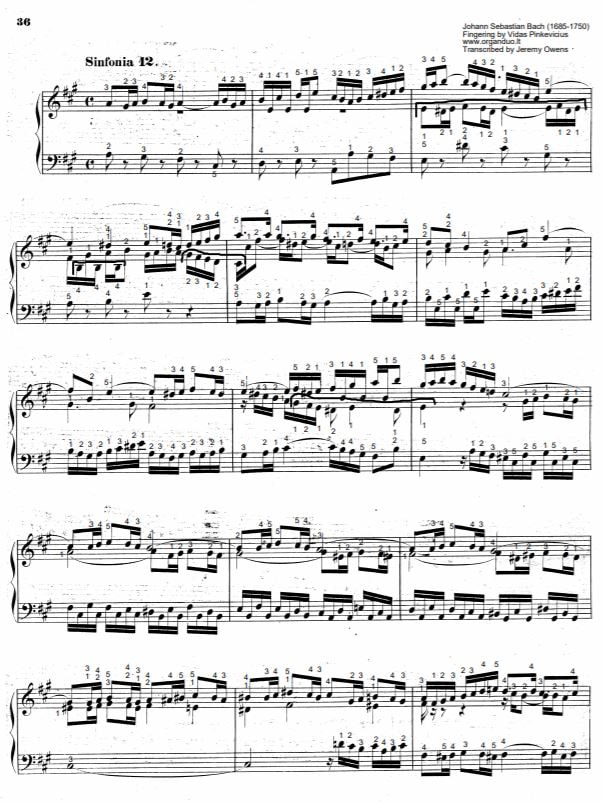
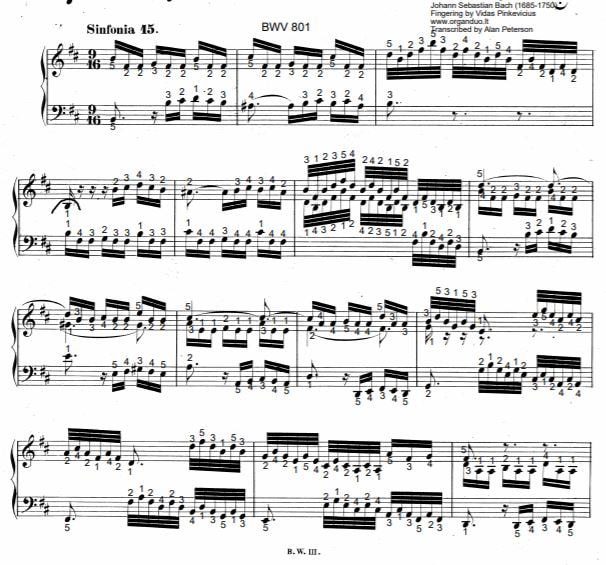
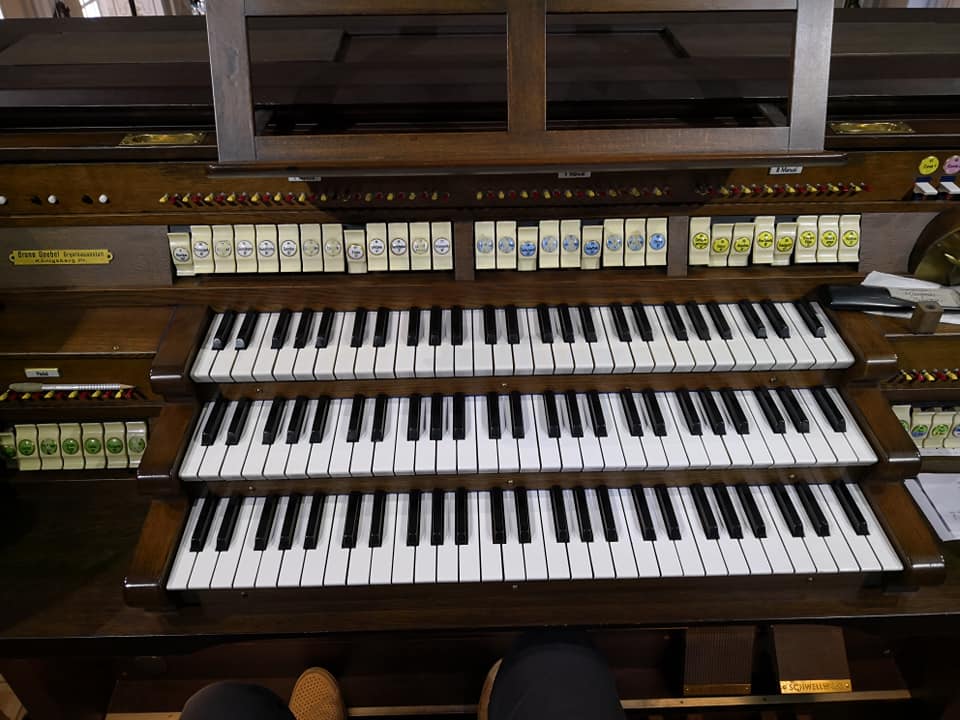

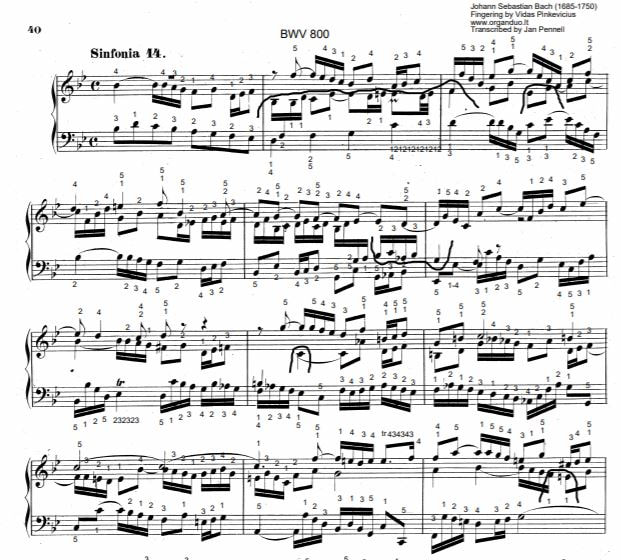
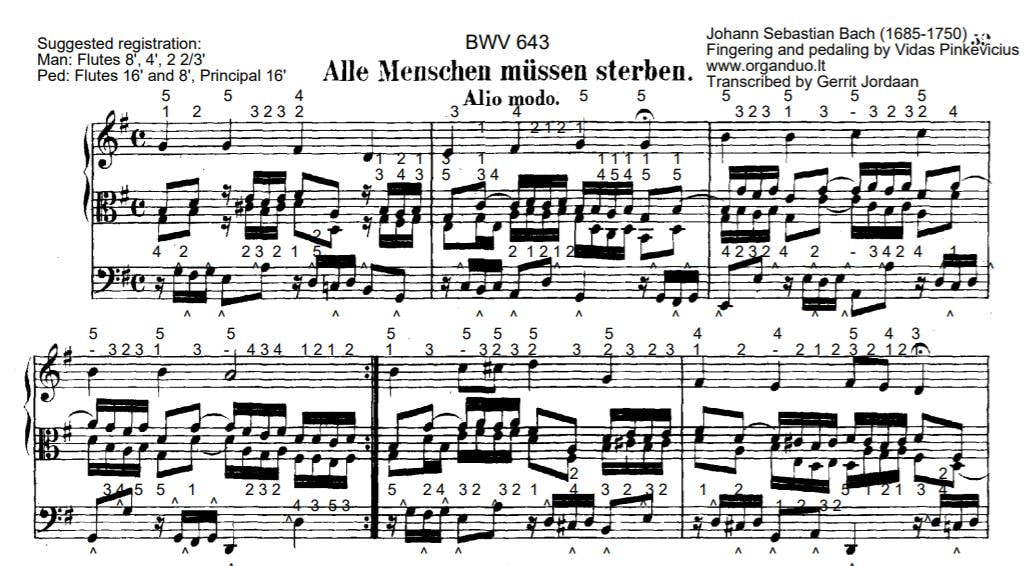



 RSS Feed
RSS Feed